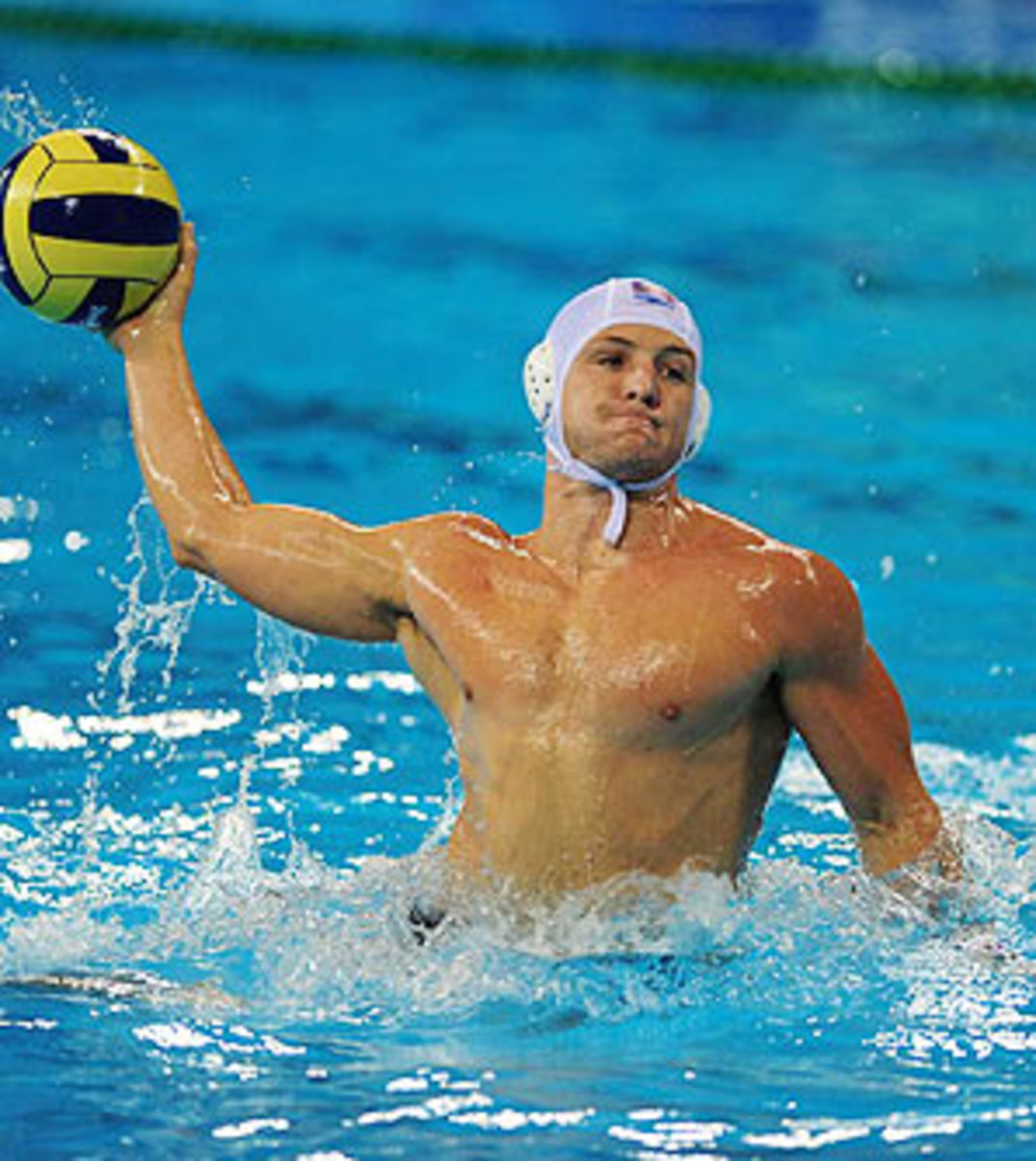Olympic water polo preview
Hey, the horse jokes were stale a century ago. No, water polo is not an original event in the modern Olympics, but it did make its entry four years later, in 1900, which gives it an authentic Games pedigree. (Women joined the pool party in 2000.) The sport also provided the Games with its most visceral political moment beyond boycotts and Tommie Smith and John Carlos' 1968 Black Power salute. In 1956, with echoes of Soviet tanks rolling into Budapest to crush the Hungarian Revolution still reverberating, the nations met in a semifinal. This match was basically war by another name.
SPORTS EXPLAINERS: WATER POLO
The 4-0 Hungary win was called with about one minute left when a Hungarian player emerged from the pool bleeding profusely after being punched by an aggrieved Soviet.
Tony Azevedo, U.S.: The USA captain joins teammate Ryan Bailey as a four-time Olympian, but the 30-year-old attacker has no plans to stop after London. Azevedo was born in Brazil -- he moved to California as an infant -- and is determined to continue his exceptional career through Rio de Janeiro 2016. Azevedo is the face of USA water polo. He made his Olympic debut in Sydney, just months after his senior prom. Four year ago he was named to the all-tournament team in Beijing, where the U.S. won the silver medal.
Gergely Kiss, Hungary: Kiss, the Hungarian captain widely considered the best left-handed player in the world, is a three-time member of the Olympics all-name team. (Unofficially, of course. More formally, he has been a star on the last three Olympic champions.) The 6-foot-4 Kiss also once played for the Soviet Union -- at least in the movie Children of Glory, about the infamous 1956 Hungary-USSR match. In the film, Kiss had to deliver on-camera lines in Russian.
Sandro Sukno, Croatia: The 22-year-old Croatian is the next great European star, if he is not considered that already. He dropped a fourth-period hat trick on the U.S. last month, propelling Croatia to the World League Super Final gold-medal match, which it won. Sukno led all scorers at the 2012 European championships with 24 goals. He is the son of Goran Sukno, a member of the Yugoslavian team that beat the Americans and Terry Schroeder, now Team USA men's coach, at the 1984 Olympics.
Tania de Mario, Italy: The Italian striker, a member of the gold-medal Italian women's team in 2004, retired in 2009 but came back at the start of the year for one final shot at Olympic gold. She was instrumental in Italy's victory at the European championship last January, scoring five goals in the semifinals against Russia and later being named tournament MVP.
Maggie Steffens, U.S.: The energetic Steffens is the future of USA women's water polo. The former SI Face in The Crowd (Aug. 2, 2010) was a high-school striker then but now is a do-everything Olympic defender, a superb field blocker. Coach Adam Krikorian likely will turn to the 19-year-old if a match goes to penalty shots; Steffens scored the clincher against Australia in the 2010 Super Final and again in the epic 27-26 shootout against Canada in the 2011 Pan American Games that gave Team USA its Olympic berth. She is the younger -- and by three inches, shorter -- sister of Team USA defender Jessica Steffens.
Team USA, which returns 11 of its 13 players from Beijing, is a solid contender but recently has failed to deliver in critical matches. The Americans played for bronze at the world championships in 2009, the World Cup in 2010 and the World League Super Final last month and each time came away without a medal. If the Americans emerge in the top two from the tough B Group, which includes Montenegro, Serbia and Hungary, they should have a reasonable path to the podium. Wins in two recent friendlies over Hungary should bolster confidence.
Although ranked sixth in the world, Team USA enters as a gold-medal favorite. The rankings are based exclusively on the 2011 world championships, the only tournament Team USA has not won recently. (Greece, the champion, didn't even qualify for the Games.) The Americans should be pushed by Australia, which it defeated in the recent Super Final, and Russia, which beat them in the 2011 worlds.
The area formerly known as Yugoslavia is a petri dish of mutating linguistic, ethnic and political grudges, which makes any match among Tito's former republics a must-see. Montenegro faces Serbia in the round robin while Croatia could face either in an elimination game.
Because preliminary games are played to slot teams for the quarterfinals rather than eliminate any team -- eight nations compete as opposed to 12 in the men's tournament -- the round-robin games lack juice. But medal matches involving China, Russia, Australia and the U.S. all will have cachet.
Brenda Villa
Considering the woman once dubbed "the Wayne Gretzky of water polo" is a four-time Olympian, she is not your typical underdog. But Villa's tale is worth retelling. In a sport dominated by blond Amazons, the 5-foot-4 daughter of Mexican immigrants grew up in the working-class, heavily-Latino town of Commerce, Calif. According to USA Water Polo, Villa became the first student at Bell Gardens High School to attend Stanford. (She has a degree in political science.) Villa has co-founded an organization called Project 20-20, which brings water polo and swimming to children in the Bay Area. Hers is an inspiring up-by-your-bootstraps story although that might be a poor choice of images. One wonderful aspect of water polo: no shoe contracts.
Beneath the surface, out of view of spectators, a considerable amount of swimsuit tugging occurs. Turbo, which makes the Team USA suits, boasts they contain "the world's toughest anti-chlorine fabric" and the dual layer design withstands "the rigors of water polo." The suits zip in the back.
Aug. 9: Women
Aug. 12: Men






